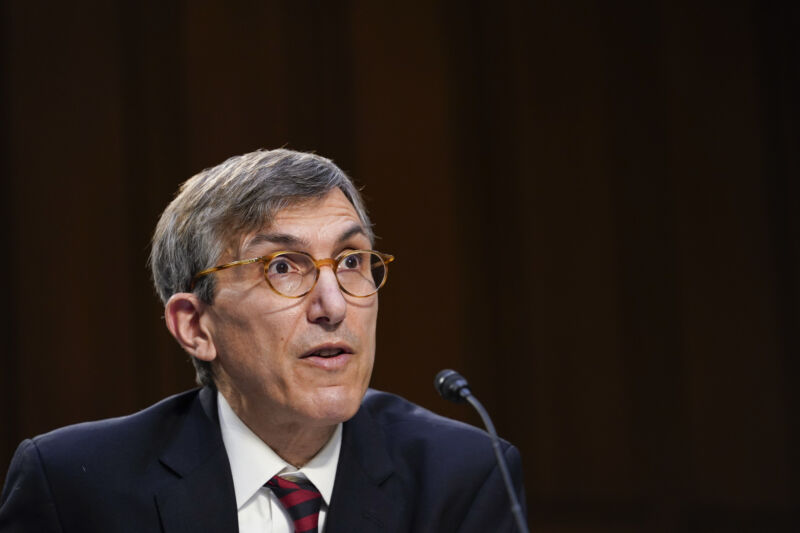
Enlarge / Dr. Peter Marks, Director of the Center for Biologics Evaluation and Research within the Food and Drug Administration on March 18, 2021 in Washington, DC.
The Food and Drug Administration (FDA) on Thursday announced expanded approval for a gene therapy to treat Duchenne muscular dystrophy (DMD)—despite the fact that it failed a Phase III clinical trial last year and that the approval came over the objections of three of FDA’s own expert review teams and two of its directors.
In fact, the decision to expand the approval of the therapy—called Elevidys (delandistrogene moxeparvovec-rokl)—appears to have been decided almost entirely by Peter Marks, Director of the FDA’s Center for Biologics Evaluation and Research.
Elevidys initially gained an FDA approval last year, also over objections from staff. The therapy intravenously delivers a transgene that codes for select portions of a protein called dystrophin in healthy muscle cells; the protein is mutated in patients with DMD. Last year’s initial approval occurred under an accelerated approval process and was only for use in DMD patients ages 4 and 5 who are able to walk. In the actions Thursday, the FDA granted a traditional approval for the therapy and opened access to DMD patients of all ages, regardless of ambulatory status.
“Today’s approval broadens the spectrum of patients with Duchenne muscular dystrophy eligible for this therapy, helping to address the ongoing, urgent treatment need for patients with this devastating and life-threatening disease,” Marks said in the announcement Thursday. “We remain steadfast in our commitment to help advance safe and effective treatments for patients who desperately need them.”
Criticism
The move, which follows a string of controversies in recent years of the FDA issuing questionable approvals over the assessments of advisors and its own staff, has quickly drawn criticism from agency watchers.
In a blog post Friday, a notable pharmaceutical industry expert and commentator, Derek Lowe, admonished the approval. Lowe expressed concern that the agency seems to be tilting toward emotional rhetoric and the will of patient advocates over scientific and medical evidence.
“It appears that all you need is a friend high up in the agency and your clinical failures just aren’t an issue any more,” he wrote. “Review committees aren’t convinced? Statisticians don’t buy your arguments? Who cares! Peter Marks is here to deliver hot, steaming takeout containers full of Hope. … And while I realize that this may make me sound like a heartless SOB, I think this is a huge mistake that we will be paying for for a long time.”
In a comment to Stat News, former FDA chief scientist Luciana Borio echoed concerns about how decisions like this will affect the agency in the longer term.
“I don’t know what to say. Peter Marks makes a mockery of scientific reasoning and approval standards that have served patients well over decades,” said Borio, who has also opposed earlier controversial approvals. “This type of action also promotes the growing mistrust in scientific institutions like the FDA.”
Internal dissent
In a series of review documents and memos released by the FDA, the divide between Marks and agency staff is abundantly clear. A review by FDA statisticians concluded that the collective clinical trial results “do not suggest there is substantial evidence to support the effectiveness of [Elevidys] for the expanded indication to all DMD patients and do not support the conversion of accelerated to traditional approval.”
A joint review from the agency’s Clinical and Clinical Pharmacology teams likewise concluded that the “totality of the data does not provide substantial evidence of effectiveness of Elevidys for treatment of ambulatory DMD patients of any age” and that the results “argue against” expanding access.
In a memo, Lola Fashoyin-Aje, Director of the Office of Clinical Evaluation in the Office of Therapeutic Products (OTP), and Dr. Nicole Verdun, Super Office Director of the OTP, concluded that the clinical results “cast significant uncertainty regarding the benefits of treatment of DMD with Elevidys.” The two directors found the primary clinical trial endpoint results were “not statistically significant” and smaller analyses looking at secondary endpoints of specific patient measures—such as the time it takes patients to rise from the floor or walk 10 meters—were “inconclusive,” in some cases “conflicting,” and overall illustrated the “unreliability of exploratory analyses to support regulatory decision-making.”
In a memo of his own, Marks agreed that primary endpoint result of the trial—based on scores on a standardized assessment of motor function in patients—did not show a statistically significant benefit. But he argued that the secondary endpoints were convincing enough for him. Marks wrote:
Specifically, although acknowledging that the Applicant’s randomized study of Elevidys failed to meet its statistical primary endpoint … I find that the observations regarding the secondary endpoints and exploratory endpoints are compelling and, combined with other data provided in the efficacy supplement and the original [Biologics License Application], meet the substantial evidence of effectiveness standard …
If Marks had not overruled the agency’s reviewers and directors, Fashoyin-Aje wrote that she would have recommended the therapy’s maker, Sarepta, conduct “an additional adequate and well-controlled study of Elevidys in the subgroup(s) of patients for which [Sarepta] believes the effects of Elevidys to be most promising.” However, Marks’ decision to approve renders the possibility of such a trial “highly infeasible to explore in a post-approval setting,” she wrote.